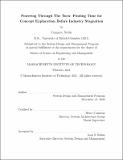Powering through the turn : finding time for concept exploration before industry stagnation
Author(s)
Noble, Connery.
Download1263357692-MIT.pdf (638.4Kb)
Alternative title
Finding time for concept exploration before industry stagnation
Other Contributors
Massachusetts Institute of Technology. Engineering and Management Program.
System Design and Management Program.
Advisor
Bruce Cameron.
Terms of use
Metadata
Show full item recordAbstract
The dichotomy of exploration and exploitation has been used in literature for many years to distinguish the needs of exploring new innovation/creating new markets versus exploiting existing capabilities/markets. This concept has been studied across various disciplines, such as organizational learning, leadership, and innovation strategy. In this thesis, we examine how this tensions plays out in large corporations, specifically in how engineering teams prioritize activities in early stage development. We argue that engineering teams inherently trade-off between exploration and exploitation during development but would benefit by more intentionally and explicitly considering their strategy, in order to ensure their efforts stay aligned with the long-term goals of the organization. Using survey data collected from over 900 system engineers and managers across a range of industries, we analyzed how engineers and organizations consider early stage development efforts, and what factors affect their importance. Notably, we observed that as an organization's market growth decreases, attention to architecture and design innovation within engineering teams also decreased. Eventually there is a tipping point in which market projections are so dire that engineering teams appear to undergo a drastic shift to refocus on exploration efforts. We also find that engineers struggle to maintain a consistent mental model of how much time and effort their organization currently wants to (or should) spend between product development phases. We argue these findings show the lack of an effective innovation strategy at the product development level, as it is inline with common pitfalls identified in other innovation strategy literature.
Description
Thesis: S.M. in Engineering and Management, Massachusetts Institute of Technology, System Design and Management Program, February, 2021 Cataloged from the official version of thesis. Includes bibliographical references (pages 71-76).
Date issued
2021Department
Massachusetts Institute of Technology. Engineering and Management ProgramPublisher
Massachusetts Institute of Technology
Keywords
Engineering and Management Program., System Design and Management Program.